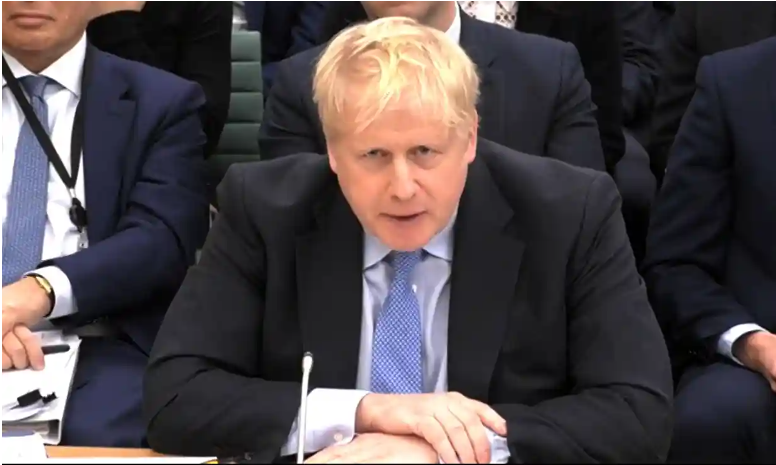Tory infighting might benefit a country desperate for the unified, tolerant political leadership that the Conservatives can’t supply
In office, Boris Johnson never took the blame for his mistakes, and never thought there was a time to walk away with dignity. So it was hardly a surprise that when his parliamentary lies caught up with him on Friday, he resigned as an MP with a psychologically revealing parting shot. In his own mind, Mr Johnson was a victim not of the facts and evidence but of a cross-party committee’s “egregious bias”. It never occurred to him that a leader overthrown amid chaos – as he was last summer – should take responsibility for the disarray.
Mr Johnson was not “forced out of parliament”. He ran away from a fight with the Commons privileges committee, whose report into Partygate apparently lands knockout punches that floored Mr Johnson. The yet-to-be-published conclusion is expected to say that Mr Johnson misled parliament about lockdown parties while prime minister; the committee was expected to recommend his suspension as an MP for more than 10 days, which could have led to a byelection that Mr Johnson didn’t think he would win.
A handful of Tory backbenchers do believe Mr Johnson, though mutterings about a “kangaroo court” will be muted after the privileges committee threatened to censure its critics. Speculation is rife that two supporters – Nadine Dorries and Nigel Adams – resigned their seats in a fit of pique, having been omitted from the list of new peerages in Mr Johnson’s shabby resignation honours list. More Johnson allies will probably leave parliament early along with their leader.
Rishi Sunak risks losing a series of byelections. Given his party’s poor standing in opinion polls, this will make Tory MPs nervous about their future. Mr Johnson knows the Tories can only move on from his circus if he leaves quietly, without recrimination. But he is determined to create mischief for Mr Sunak, whom he believes to be behind his downfall. The pair deserve each other. Mr Johnson failed to deal with questions of inequality and insecurity posed by the pandemic. Mr Sunak’s fiscal conservatism is equally unsuited to answering them. Both men are also embroiled in a row over Mr Sunak’s decision to deny the official Covid-19 inquiry unredacted versions of Mr Johnson’s WhatsApp messages and personal diaries. The prime minister’s decision to go to court over the matter has raised the obvious question about what he is trying to hide.
Narcissism and opportunism lie at the root of Mr Johnson’s politics. He looks to profit from the chaos he brings to public life, seeking refuge in paranoia. “There is a witch-hunt under way,” Mr Johnson claimed in his resignation letter “to take revenge for Brexit and ultimately to reverse the 2016 referendum result.” His removal is “the necessary first step” of “a concerted attempt” to this end. This is a self-serving delusion. Leaving the EU has damaged Britain, but there is a political consensus about making the best of a bad deal.
Mr Johnson was, and is, unfit to lead the country. He would do better to learn from his setbacks, rather than live in denial of what caused them. But he won’t. Instead he will probably try to ruin Mr Sunak’s prospects through well-paid speeches and columns. Paradoxically, this might benefit a country desperate for the unified and tolerant political leadership that the Tories can’t supply. Conservative members might be fooled, but most of the party’s MPs know Mr Johnson to be a lazy, selfish dilettante. They, wisely, don’t want him back in parliament. Neither does the great majority of the electorate.
…as you’re joining us today from Nigeria, we have a small favour to ask.
The Guardian has spent the past 13 years tirelessly investigating the shortcomings of the British Conservative government – austerity, Brexit, partygate, cronyism, the Liz Truss debacle and the individual failings of ministers who behave as if the rules don’t apply to them.
Our work has resulted in resignations, apologies and policy corrections. And with an election just round the corner, we won’t stop now. It’s crucial that we can all make informed decisions about who is best to lead the UK. Will you invest in the Guardian this year?
Unlike many others, the Guardian has no shareholders and no billionaire owner. Just the determination and passion to deliver high-impact global reporting, always free from commercial or political influence. Reporting like this is vital for democracy, for fairness and to demand better from the powerful.
And we provide all this for free, for everyone to read. We do this because we believe in information equality. Greater numbers of people can keep track of the events shaping our world, understand their impact on people and communities, and become inspired to take meaningful action. Millions can benefit from open access to quality, truthful news, regardless of their ability to pay for it.









